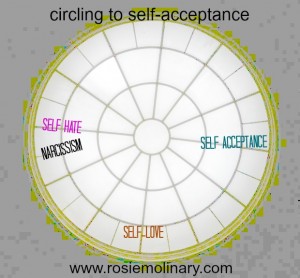 “What is self-acceptance?” I often ask towards the beginning of my 10 Truths for Your Self-Acceptance Journey talk.
“What is self-acceptance?” I often ask towards the beginning of my 10 Truths for Your Self-Acceptance Journey talk.
“Self-love!” People often shout back.
And while self-love might be one’s expression of her self-acceptance, I think of self-acceptance as a little different from self-love.
Imagine a line: a continuum from self-hate to self-love, if you will. With self-hate being the furthest point to the left and self-love being the furthest point to the right (for this example). I like to think of self-acceptance as neatly residing between them—a position of neutrality about the self—a place where one understands that she has worth and power and dignity simply because she exists. Worth does not need to be earned. It doesn’t have to be proven. It just is.
For some people, the concept of self-love is terribly uncomfortable for a litany of reasons: upbringing, faith, culture, temperament, ideas around language, etc. What they imagine it to be makes them self-conscious. So having self-love be the ideal destination feels too inauthentic (to themselves) and, thus, they avoid it, choosing over and over again a relationship with the self that looks like the opposite of self-love, lest anyone think they are self-impressed or arrogant or anything else.
“I don’t want to be a narcissist,” people have said to me.
But I would argue that narcissism is not the polar opposite of self-hate but just a reinterpretation of it.
Now, imagine the continuum of how we feel about ourselves is no longer a line but a circle. If self-hate is just north of due west on a compass, then narcissism, I believe, is just south of due west. Narcissism is the result of someone desperately trying to reconcile her self-hate but using the wrong tools and truths to get herself there. We might think that what she has is self-love run amok but what she actually has is the other side of the self-hate coin.
Let me be clear that I do not think that practicing and embracing self-love is being self-impressed or arrogant. But I do understand that sometimes semantics can keep us away from a practice that might be good for us and so I yearn for a way to make a positive, healthy relationship with the self accessible to everyone so that we all might be able to embrace a healthier way of relating to ourselves. Given that, I focus my energy on encouraging self-acceptance.
Imagine self-acceptance as operating from the decision to NOT have an adversarial relationship with one’s self. Your worth doesn’t have to be earned. You aren’t bad, ruined, imperfect. There is nothing fundamentally wrong about you.
In fact, you are fundamentally right because you exist, because you, just like every other person, was put here on purpose. Ultimately, you chose to recognize your humanity just as you recognize and respect the humanity of others.
So much of our personal angst comes from a scarcity mind-set. We believe that there is not enough for all of us and so there mostly definitely isn’t enough for us because we are see everyone else’s specialness and consider them deserving while we refuse to see our own uniqueness and consider it worthy. So all of them, they get all the things. We get nothing because we deserve nothing. We have a scarcity mindset when we feel competitive, when we think that we are inadequate, when we are judgmental of ourselves or others.
But what if we started, instead, to shift our mindset to abundance. What if we realized there is enough room to respect ourselves even as we respect others? What if we realized that we can live on purpose just as much as someone else? What if we weren’t scared that the promotions, book contracts, life partners, food, money, vacations, perfect jeans, etc. would run out before we got ours? What if we quit thinking that it’s all going to run out? Then we would probably quit feeling like the sky is falling. We would probably quit feeling like OUR sky is falling.
Self-acceptance is our recognition that we have worth just as we are.
It is our decision to not have an adversarial relationship with ourselves.
And it is our awareness that the world is abundant, and that when we can get humanity to understand this, everything expands. Even more becomes possible for each one of us.
Today, I want you to consider what self-acceptance would give you if you decided to embrace the practice in your life.
If you showed up every day with self-acceptance, how would your life be different? What would that mean for you?
In what ways do you need to see the world as more abundant?
How do you begin today?



